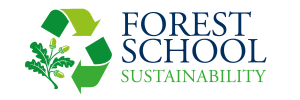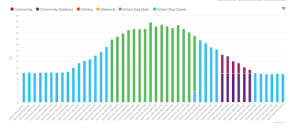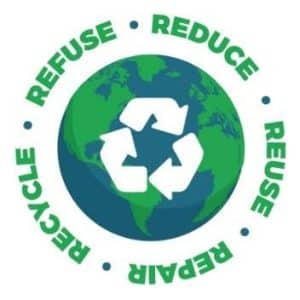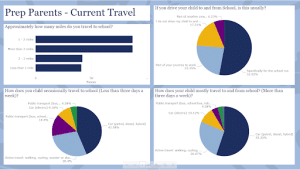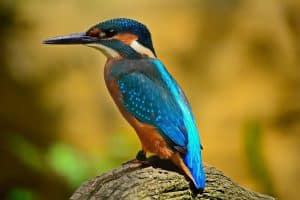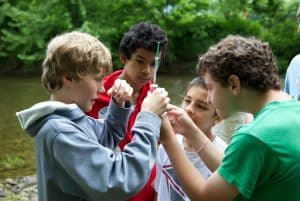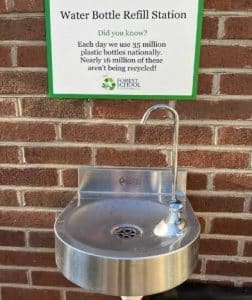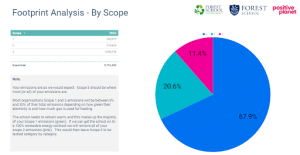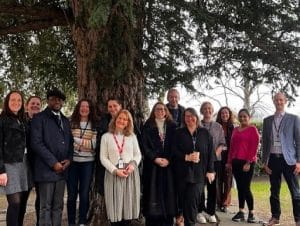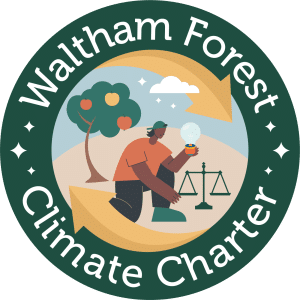Forest by name, Forest by nature.
Our aim is to develop a School community that is outward looking, with a strong global perspective, focusing on cumulative steps that will develop and deliver significant culture-changing impact. Technology alone will not address the challenges we face. We need to promote and support positive environmental behaviour changes, where the whole community thinks and acts differently, creating a ripple effect that travels beyond the white gates and out into homes and communities.
Our Sustainability vision can be downloaded here. Our full Environmental Sustainability Strategy and Development Plan is available here:
Forest School Environmental Sustainability Strategy and Development Plan 2023 – 2025
We are very proud of the steps that we are taking and excited about all of the great work that continues to move us forward. Have a look at our most recent progress in our Sustainability Report 2023 – 2024.
Click here to find out about what we got up to during Sustainability Week 2023!
School Values
Growth: Giving our pupils the tools, resources and learning to become the next generation of environmentalists
Learning: Giving our pupils an excellent environmentally focused education, providing opportunities for learning across the whole spectrum of sustainability
Hard work: The planet is starting on the back foot. Little, by little, piece by piece, our pupils can make a real positive impact if given the right opportunities in School
Diversity: To create the next generation of environmentalist can only occur if the workplace provided, allows them to be themselves and contribute to their best abilities
Responsibility: Giving our pupils the motivation and encouragement to become active, responsible transition leaders now and in the future
Wellbeing: Pupil wellbeing is a core Forest value. Developing environmentally conscious young people will increase their sense of control over their future
Community: Sharing our carbon literacy educational programme with other local schools through our outreach programme
Pupil Led Sustainability Working Committee
We have an ever-expanding group of hard working and passionate pupils driving the School’s sustainability mission. They meet every week to develop ideas and campaigns focused on making Forest more sustainable and ultimately net zero.
Energy
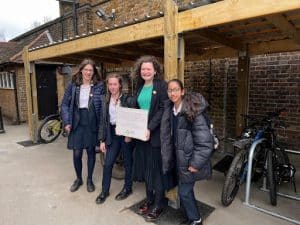
We are phasing in LED lighting and sensors across the School to replace less efficient systems and fittings.
We have commissioned an Estates Decarbonisation Plan to inform our move towards reducing reliance on fossil fuels and our ambition to generate our own power.
Food
In January 2023 we introduced Meat-Free Mondays. By not eating meat, including fish for one day a week over the year, we effectively create an marine reserve of 11.7m2. This was instigated and driven by our Pupil Led Sustainability Working Committee.
Food Waste
At Easter 2023 we introduced the Winnow food analysis waste solution in our kitchen and plate waste areas to help us run a more sustainable catering operation. Winnow’s waste tracking analytics will empower us to make more informed menu decisions and develop pupil awareness and knowledge on the impact of food waste. At the same time we shall also be reintroducing our food composting area.
Our Catering provider, Chartwells, is working actively with the School to reduce our carbon impact. You can read there sustainability policy here
Recycling
In September 2023, we plan to launch our new recycling initiative based on the circular economy.
We have removed 64 paper towel dispensers, responsible for 34,000 non-recyclable paper towels being used each year.
We will work actively with each department to encourage reuse, repair and upcycling before resorting to disposal. Similarly, we shall work with Bywaters, our waste management company, on ways to increase our recycling quota. Our remaining general waste does not go to landfill; it is carried, along the Thames, to a central London hub for incineration, the energy from which is then used to power London homes.
We have instigated stationery, textile and battery recycling hubs across the School.
Travel sustainability
A full travel survey was conducted in January 2023 as part of our carbon mapping exercise. This led to two new bike shelters (supplied by the UK’s only sustainable shelter provider) being installed in February 2023, increasing our bike storage by 70% to encourage staff and pupils to try active travel rather than by petrol/diesel car. We partner with Cycle Spirit Leytonstone to offer staff and pupils discounts on bikes and servicing, as well as a tax-saving cycle purchase scheme for staff.
We recognise the importance of promoting car traffic reduction in our area particularly around drop off/pick up times. We run a daily home to school bus service, used by around 250 pupils, to help towards this. We work actively with the sustainable transport project team at Waltham Forest and the TfL STARS framework, to promote and record our activities and progress. This commitment has been recognised by TfL which awarded Forest the STARS programme gold accreditation for our work on promoting reduction in car use and actively engaging our pupils and staff to undertake activities that promote more active, safe and sustainable travel.
In June 2023 we shall hold our inaugural clean air week and during which pupils will engage with parents at the front of the School to talk about park and stride options and the effects of idling engines.
Biodiversity
Our privileged location on the edge of Epping Forest means we have been able to develop our own mini woodland which not only helps develop and encourage biodiversity but also allows our pupils to benefit from educational experiences in the natural environment. An important part of our ambition in this area is to plant additional native trees, create biodiversity hotspots and track improvements in nature. We have a living wall in the Science block; additional trees have been planed outside the Martin Centre and in Summer 2023 work will begin on a vegetable growing and composting area.
Sustainability and Environmental Education
In June 2023 our whole Year 7 cohort will take part in a sustainability and environmental educational visit to Wales. Organised by Flooglebinder, a carbon neutral organisation our pupils will learn about marine conservation and inspect based meals while enjoying adventurous activities such as coasteering and surfing.
From September 2023, Sustainability will be taught in Years 5 and 6 for one whole term. In the Senior school, there will be a sustainability lesson at least once per half term as well as speakers at assemblies and lectures.
From September 2024, sustainability will be included in every subject, creating a circular curriculum that embeds sustainability into all aspect of learning.
Forest is part of the London Schools Eco-network, giving pupils a voice and the opportunity to collaborate with other like-minded schools to integrate sustainability in the curriculum.
Water
In October 2022, in a drive to eliminate single use plastic water bottles, the School installed three new water fountains so pupils can refill their own, reusable, water bottles. The School is also investigating the process of harvesting rainwater for our sports pitches and gardens.
Plastics
In January 2023 our Pupil Led Sustainability Working Committee successfully introduced a ban on single use water bottles saving over 10,000kg in carbon emissions per year. We asked all pupils and staff to bring in their own, reusable, bottle.
Where plastics exist on the Forest site, we are now actively researching potential alternatives. Some quick wins have included eliminating the use of sauce sachets at lunch in favour of tubs/bottles, and switching to zero-waste cleaning products and biodegradable food containers.
Our Design & Technology department is researching how to incorporate waste plastic bottle lids to into DT coursework projects.
Carbon Footprint analysis
Forest has partnered with Positive Planet which has undertaken an analysis of our carbon footprint. Pupils supported the data gathering exercise and this has now been verified as an accurate picture for a school our size. The work now begins, as laid out in our sustainability strategy and development plan, to reduce our carbon footprint and to become net zero as soon as is reasonably practicable.
Carbon Literacy Trainers
We have a group of ten passionate carbon literate certified staff. There mission is to make changes at home and at work. It is estimated that every carbon literate person will reduce their emission by 5-15%. We are committed to training all staff and pupils by September 2024 and to then offer the course to neighbouring schools and businesses.
We have partnered with Waltham Forest and have signed up to their Climate Charter, once again demonstrating our unwavering commitment to protect this planet now and for future generations.
Anything to offer?
If you are passionate about defending our planet, have skills in sustainability or would like further information on any project we are aiming to achieve please do get in touch via sustainability@forest.org.uk
What are the stripes?
No words. No numbers. No graphs. Just a series of vertical coloured bars, showing the progressive heating of our planet in a single, striking image.
The climate stripes were created by Professor Ed Hawkins at the University of Reading in 2018.
They show clearly and vividly how global average temperatures have risen over nearly two centuries.
How do they work?
Each stripe represents the average temperature for a single year, relative to the average temperature over the period as a whole. Shades of blue indicate cooler-than-average years, while red shows years that were hotter than average. The stark band of deep red stripes on the right-hand side of the graphic show the rapid heating of our planet in recent decades.


